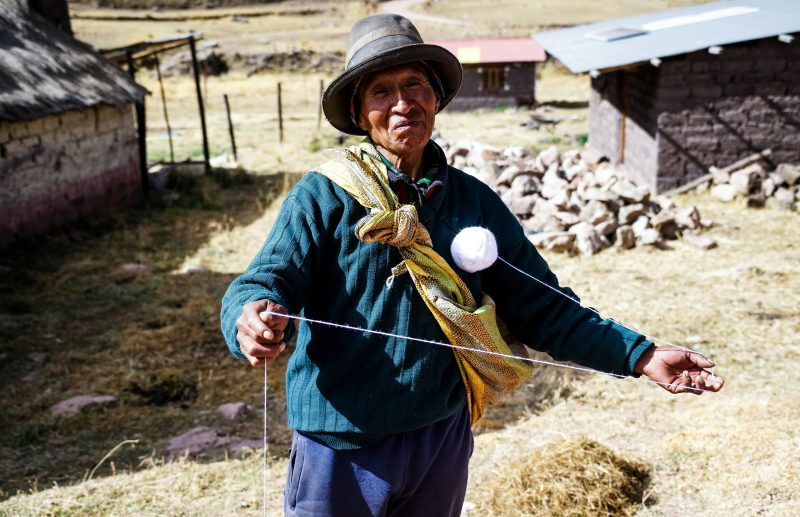Peru – Greening the MSME sector in a time of political instability
Libélula has been building a green community through a dialogues process while dealing with years of political instability in Peru

Over the last 15 years, Peru has seen a huge push towards green growth – driven by international commitments and the decision to pursue OECD membership. However, due to a range of issues, including rapidly changing government priorities, Peru’s green economy remains fragile and underdeveloped.
High political instability in Peru since 2016 has brought allegations of corruption, scandals, impeachment votes and in 2020, three different presidents in the space of five days. Through this period of widespread political unrest, the GEC hub in Peru, Libélula, has been working hard to build a green community through a dialogues process, promoting a collective voice that could bolster societal demand, advocate in the policy space and show Peruvians how the green economy and market could benefit them.
Micro small and medium enterprises (MSMEs) represent a staggering 96% of all enterprises in Peru and comprise 84% of the workforce. They are vital to the economy but are very vulnerable. Around 50% of new enterprises don’t survive their first year. Within this sector, a new and more sustainable type of enterprise has begun to appear, namely green MSMEs, but their chances of surviving are even lower. The extra costs implied in greener products puts these businesses at a disadvantage. As a result, the government guidelines for green business identification and promotion, give recognition to MSMEs as “Ecobusiness” and “bioBusiness”, thus intending to create more favourable conditions for green business.
Community is key to unlocking green policy – dialogue, dialogue, dialogue
Libélula has reinforced these national efforts through establishing an online directory for green MSMEs. The environmental focus sets them apart and the platform allows members to connect with socially responsible green businesses, link up with opportunities in the market and showcase green alternatives. In person, networking spaces such as trade fairs and forums were created for MSMEs to interact and connect with policy makers and private and public agencies.
In phase 2 of this project, the finance dialogues, the work focussed on strengthening local green enterprise (LGEs). Libélula developed and disseminated a Contextual Financial Analysis (CFA), creating spaces for fruitful dialogue to encourage green growth. The CFA was the first document of its kind in Peru and has been a valuable contribution. Two green enterprise platforms, in Arequipa and Piura, were created allowing exchange of information and a space for empowerment and inspiration.
The platforms brought together representatives from the local government, public sector, financial institutions, academia and green entrepreneurs. Together, they worked to co-create incentives for green enterprises to restore sustainability in their local economies and proposed actions to overcome LGEs access to finances, fostering self-organisation with a view of creating policy change. Connection is key for Libélula and they sought to create spaces for enterprises to engage and find opportunities to develop their ideas and exchange experiences. Virtual webinars connected LGEs with financial management advice, digital tools and available financing alternatives.
“ Community backing is key for change and puts pressure on national government to act and create conditions to promote green business. Libélula has the means to reach national government and plays a vital role of connecting green entrepreneurs and enterprises to the right government bodies”
A fluctuating government but the green message remains clear
Libélula created ‘green working tables’ in order to reactivate the economy after the COVID pandemic, enabling stakeholders to define important issues and connect with the local government and financial institutions. However, due to a change in government, the programme was halted and was not reactivated.
Constant government turnover like this has made creating and cementing change in Peru extremely difficult. Often initiatives start with a relatively stable government and the focus is clear, but when there is a struggle for power, green initiatives stall. The weight and importance of a collective voice all saying the same thing is paramount for the green agenda and social issues to traverse through multiple governments. The success of the green tables in Arequipa enabled a bank to raise approximately 1 million dollars for green enterprises. The potential of these small initiatives can result in real positive change.
Notably, in 2021, the government passed the Collective Benefit Enterprise Law (BIC Law). Libélula played a significant role in creating the foundations to allow this legislation to succeed, including promulgating the word to collect enough signatures for the law to be considered in congress. A third of the signatories were from the GEC network. This law enables consumers to identify green enterprises that generate positive social and environmental value via a certification scheme, creating a clear benefit and incentive to existing and new green enterprises. The uptake of this law was slow and progress stalled due to a change in government. Libélula has recently brought renewed energy to promote the legislation, resulting in increased uptake.

One thing is clear, social demand gets results. If initiatives have the weight of voice behind them, change can happen. Community backing is key for change and puts pressure on national government to create conditions to promote green business. Libélula has the means to reach national government and plays a vital role in connecting green entrepreneurs and enterprises to the right government bodies. They were able to promote the idea of circular economies to the Ministry of Production, helping to create a circular map on how to accelerate this concept forward. They also proposed a directory of green enterprises to the Ministry of Environment who created a similar model. This type of engagement with key bodies puts Libélula in a strong position of influence.
A push for green messages in upcoming elections
The push and pull between the Peruvian hub and an unstable and fluctuating government is evident in the lifecycle of this project. Libélula has pushed forward the green agenda, creating a thriving hub of LGEs and entrepreneurs who support and advise each other. They connect these stakeholders with financial institutions and government so their priorities can be fed upwards, with the hope that this will influence policy.
Ultimately, the community must be kept alive and helped to flourish. With yet more elections planned for next year in Peru, there is opportunity to connect entrepreneurs with government bodies to ensure the green message is heard and show the demand for green policy.
- Zaiza Khan, GEC


